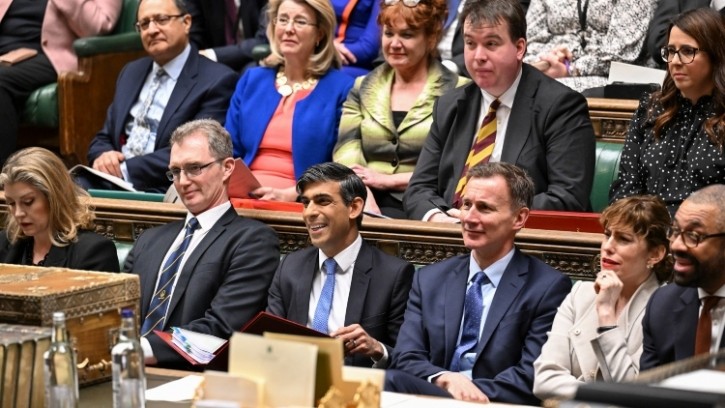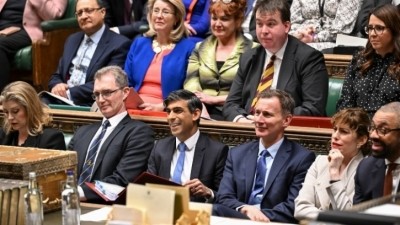SPRING BUDGET 2024
Business rates to go up as freeze ends

Commercial real estate intelligence group Altus Group said almost 220,000 English businesses, including pubs and bars, with rateable values of £51,000 and above will shoulder the costs as planned business rates come into force for the next financial year.
The hospitality sector is included in the Valuation Office Agency’s ‘other’ sector of 68,930 properties (from within the 220k businesses) in England, which Altus Group said will see an increase of £507.91m in business rates effective from 1 April for 2024-25.
The Chancellor announced in his November 2023 Autumn Statement, the Government would freeze the small business multiplier at 49.9p but chose to uprate the standard multiplier by last September’s CPI inflation rate of 6.7%.
Accordingly, the non-domestic standard rating multiplier in England of 51.2p for 2023-24 was set to increase to 54.6p from 1 April for 2024-25, an effective tax rate of 54.6%, without intervention from the Chancellor.
For reference, the non-domestic standard rating multiplier in England has risen by almost a third since 2010 when it was 41.4p.
Biggest YOY hike since 1991
Altus Group president of property tax Alex Probyn said firms in England will now be paying £7.4bn a year more in business rates than in 2010 and added: “The 6.7% increase, at an effective tax rate of 54.6%, will mean that in April firms will face the biggest year-on-year increase to the standard multiplier since 1991 despite the UK’s headline rate of inflation set to fall below the target rate of 2% within the coming months.
“This is no way to encourage investment and foster economic growth especially after two consecutive quarters of contracting GDP.”
On the Spring Budget, which took place on Wednesday 6 March, the British Institute of Innkeeping (BII) CEO Steve Alton said it has delivered “no support for independent pub businesses in every village, town and high street across the UK”.
Meanwhile, the Night-Time Industries Association (NTIA) has summarised Hunt’s Budget message to hospitality as “you’re on your own”.
NTIA CEO Michael Kill said: “Even the Autumn Budget last year, which extended business rates relief, was marred by the Government’s use of it to offset increases in the national living wage, demonstrating a pattern of giving with one hand and taking with the other.”
British Beer & Pub Association (BBPA) chief executive Emma McClarkin explained: “This April, brewers and pubs still face a £450m cliff-edge of spiralling wage costs and business rates increases, particularly those pubs that are larger or food-led.
“It is disappointing the Chancellor did not choose to go further with a cut duty, reduce VAT or cap the increase to the business rates multiplier, which would have helped mitigate the huge cost of doing business.”
It's time for change
Drinks producer Heineken welcomed the freezing of alcohol duties but added licensees across the UK now need further help to thrive, in the form of long-term, fundamental reform to the business rates system that, despite recent support, still sees UK pubs overpaying by £400m.
Likewise, St Austell Brewery welcomed the freeze on beer duty but added: “Great British pubs are at the heart of their communities but they remain over-taxed and under increasing pressure due to the impact of inflation, the cost of living, reduced footfall and high operating costs.
“This was not addressed in today’s budget. We therefore urgently need the long-term reformation of business rates, a VAT cut, and more meaningful government support to reduce the tax burdens on our sector – one of the UK’s leading employers and social and economic contributors.”
Hospitality Ulster chief executive Colin Neill said: “In the Chancellor’s Autumn Statement, he announced businesses in England would receive significant relief on their business rates until 2025. It’s jarring that any Barnett Consequential of this was not passed on to us for this year. With the monies now coming to the executive, it is essential they are passed on to the businesses that need it.”
The Chancellor’s failure to ‘right the wrongs’ of the 2023 Autumn Statement and cancel the business rates increases planned for April was “massively disappointing”, said property expert Colliers.
“Given the Chancellor confirmed the OBR has forecast inflation to be below 2% in 2 months’ time, it is outrageous that all but the smallest of UK businesses will be paying increased business rates tied to a multiplier that will increase from 51.2p to 54.6p in the pound in line with the 6.7% inflation figures of last September.”
NTIA’s Kill concluded: “In simple terms, it’s time for change. We have lost faith in the Government.
“The livelihoods and businesses we represent are not political pawns but vital contributors to community well-being across the UK. It is imperative that the Government recognises this and takes decisive steps to support the sector.”







